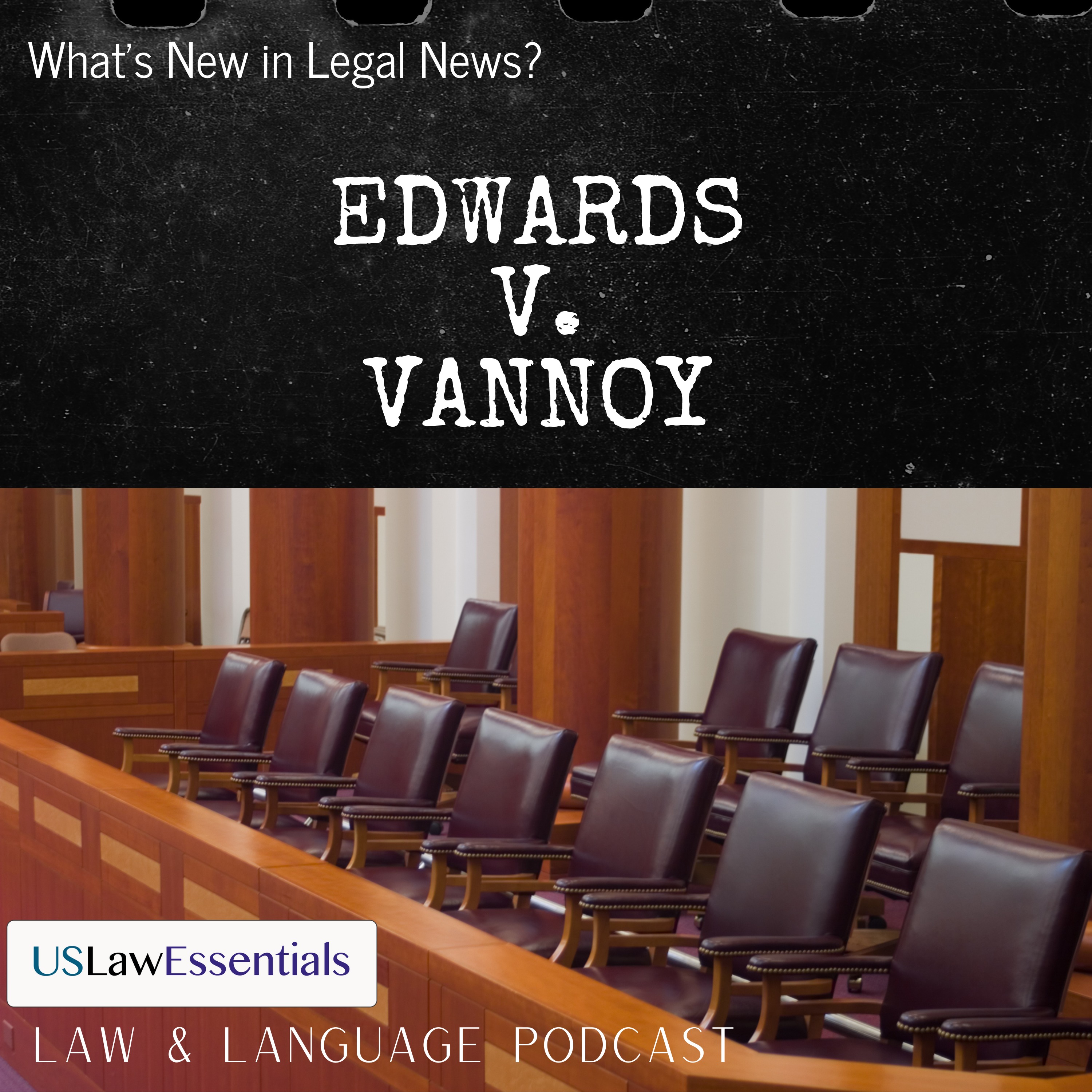Episode Transcript
Speaker 0 00:00:00 Welcome to the U S law essentials law and language podcast. The legal English podcast for non-native English speakers. That helps you improve your English, listening, improve your legal English vocabulary and build your knowledge of American legal culture.
Speaker 2 00:00:21 Hi, I'm Daniel
Speaker 3 00:00:21 Edelson and I am Steven Horowitz
Speaker 2 00:00:25 And welcome to the U S law Central's law and language podcast. We're continuing our what's new in the legal news series. And today it's Steve stern. Steve, what do you have for us?
Speaker 3 00:00:37 Okay. I've got an article from the NPR website, a judge to dismiss Sarah Palin's defamation suit against New York times. You got that?
Speaker 2 00:00:51 I do. I do. But, um, there's a couple of characters here. There's the New York times. I bet everyone knows what the New York times is.
Speaker 3 00:01:00 That's like the most esteemed and established newspaper.
Speaker 2 00:01:06 Yeah. Um, but Sarah Pailin Sarah Pailin. Um, do you remember who she is?
Speaker 3 00:01:14 Yeah, she was, she was the vice president candidate when Senator John McCain ran against Barack Obama for, uh, w the first time that Barack Obama won and became president. He was running against John McCain and John McCain selected Sarah Pailin as his vice president running mate. And she was the governor of Alaska at the time. And she turned out to be a real character.
Speaker 2 00:01:48 That's, um, that's a, that's a very fair characterization of her.
Speaker 3 00:01:54 And we'll leave it at that. If you want to learn more about, or you can, you can Google her or search for her online, but anyway, a very colorful character. And so, uh, she was in the middle of a lot of controversies, and this is one more controversy that she ended up in the middle of. And so it led to this defamation lawsuit against the New York
Speaker 2 00:02:19 At times. Okay. So now we know who Sarah Pailin is, but there's this word defamation, and Steve I'd ask you what defamation means, but that's a legal term. And I just don't think you know anything about the law.
Speaker 3 00:02:32 Oh, wait a second. We're on a podcast here. And I think you just defamed you. I think you just defamed me. You just defamed my character, Dan.
Speaker 2 00:02:42 I might have, I really just might have by suggesting that you're a lawyer on a legal podcast and you don't know what defamation means, so, all right, well, we'll go ahead. Prove me wrong.
Speaker 3 00:02:55 Defamation is when you damage somebody's reputation and it could be, there's two, there's sort of two categories that traditionally, uh, are distinguished. One is liable. Um, L I B E L, which means defamation in writing and the other is slander, which is defamation, uh, in an oral statement. Um, and the three terms, defamation, libel, and slander are even, even by Americans and native English speakers are often used interchangeably and kind of confused, but that's the sort of the traditional explanation.
Speaker 2 00:03:34 Right? And so certainly defamation is like the umbrella category for both written and spoken, um, words that would, uh, insult someone's character.
Speaker 3 00:03:48 Yeah. So that's what happened here. Do you know, how do you know why Sarah Pailin felt like New York times insulted her character?
Speaker 2 00:04:00 I can think of all sorts of reasons why she deserved to have her character insulted, but I don't, I don't know what actually led to this lawsuit. Do you?
Speaker 3 00:04:14 I do. I do. So in this case, Sarah Palin felt that the New York times, uh, had insulted her reputation because they published an editorial. And in the editorial, they accused Sarah Pailin of having political ads that incited an earlier shooting of a congressperson. Something that had happened several years ago.
Speaker 2 00:04:40 Oh. So the New York times wrote an editorial and in it, they, they accused Sarah Pailin of inciting an earlier shooting. W w what does, what does inciting mean?
Speaker 3 00:04:59 Inciting means, I guess it's a combination of caused, um, and, uh, motivated other people to, uh, it sort of, um, encouraged other people to do something. If you incite a shooting, you somehow cause other people to feel like they want to go out and shoot people.
Speaker 2 00:05:23 Oh, okay. Yeah. Inciting is, it's a strong word. It has sort of like this, um, it's like a spark, right? It's like you said, you set off the spark and then there's this big explosion.
Speaker 3 00:05:35 So yeah. Sometimes we talk about inciting a riot or inciting violence. Um, we don't talk about inciting breakfast.
Speaker 2 00:05:46 Right, right, right. Um, yeah, it would, it would be, um, it would be obviously an exaggeration if you said, oh, you incited me to make pancakes for
Speaker 3 00:05:57 Right. That would, that would, yeah. That would feel very strange. There would have to be something
Speaker 2 00:06:01 On the other hand you could say, oh, I w I was, so I was so angry. The story incited me to throw a pancake at you.
Speaker 3 00:06:11 Yes. Yeah. But please don't throw if you throw pancakes at me. Uh, I don't know that that would be defamation, I guess that would be assault or battery.
Speaker 2 00:06:21 Battery. Yeah. Yeah. It could be assault. That's all, I'm better. All right. Anyway, so back to defamation, but wait a second. There has to be under us law. If you, if you defame someone, there has to be something that's really false. Like you have to say something that's untrue. So how was, how was anything that the New York times wrote untrue with respect to accusing Sarah Pailin of inciting this violence?
Speaker 3 00:06:55 In this case, there was a political ad that Sarah Palin's campaign, uh, had run. And in it, they had cross hairs,
Speaker 2 00:07:05 Cross
Speaker 3 00:07:06 Hairs, cross hairs. If you ever shoot a gun, like a, like a rifle, like a long gun, and it has like a telescope on it and you look through it, and then you see the lines that show you where exactly where you're shooting. Those are called cross hairs. So if somebody is in the cross hairs, that means if you pull the trigger, the bullet is going to hit that person, that target,
Speaker 2 00:07:29 Right? Because it looks like a cross cause there's a vertical line and a horizontal line,
Speaker 3 00:07:34 Right? So if you do a picture where you have cross hairs over somebody's head or face, it suggests that that person is going to be shot. Um, and the New York times said that she had incited the shooting because they had political ads that had cross hairs over different politicians, faces or heads in the pictures. And that part was not actually true. They had cross hairs over different districts, so different areas where a candidate might run. So I guess that still suggests a certain violence, but it's a little more metaphorical since there's not a person in the cross hairs.
Speaker 2 00:08:20 Oh, I see. I see. Because if you put cross hairs over a person in an ad, it suggests, okay, I want you to shoot this person because this person doesn't agree with our political opinions. But if you put cross hairs over a geographical area, you're sort of suggesting, okay, the people in this area are actually, you know, being targeted. They're the ones who might get hurt by bad politicians. So they should vote for better politicians.
Speaker 3 00:08:55 I guess that's what the argument would be. But in any event, what the New York times said, how they describe it was not accurate. And so they connected her to this shooting that happened. And she said, you know, she said, that's, that's not fair. That's not fair at all. So she sued the New York times in federal court for defamation of character.
Speaker 2 00:09:21 Well, it sounds like she's got a pretty strong case then. Cause it sounds like the New York times wrote something that wasn't true, you know, in terms of cross hairs on people's faces that wasn't true. And it sounds like it's a pretty negative thing to say about someone like, oh, you're, you're, you're encouraging people to, to shoot and kill other people. So if you have an untrue statement that would be insulting to Sarah Palin's character, how could she possibly lose this case?
Speaker 3 00:09:53 I'm Dan, I'm glad you asked that the rule for defamation is actually a very high standard and it was set in a previous, uh, Supreme court decision from 1960 called Sullivan versus New York times. And the standard is that a public official must show that what was said against them was made with actual malice. That is with knowledge that it was false or with reckless disregard for the truth.
Speaker 2 00:10:26 All right, let's slow down a second. So according to this Supreme court case, New York times V Sullivan, if I'm a politician and I'm suing a newspaper for defamation, I have to show that the newspaper not only made a false statement, but it made the false statement, knowing that the statement was
Speaker 3 00:10:52 False or intentionally ignoring the truth.
Speaker 2 00:10:55 So plaintiff has to show that the defendant either completely made up these facts or just disregarded that the facts had to be untrue
Speaker 3 00:11:03 And they did it to protect free speech because of the first amendment and free speech protections. So it's actually a very high standard. And what happened in this case in Pailin versus New York times is that a lot of emails came out, uh, emails between the editors of the New York times. And it became pretty clear from the emails that the, um, the editor had put in the term, but didn't realize that it was not false. And as soon as they realized that it was false, they took it out. But it was just after it was published, it was the same day they redid it and published a correction. So that was not true. So in the end, it didn't meet the standard of actual malice. They were not consciously trying to publish something that was not true.
Speaker 2 00:11:59 I see. So it sounds like because this was a mistake that because maybe an untrue statement was made carelessly or negligently, then the New York times would not be liable for this false statement about Pailin because it was, it was a mistake that they corrected as soon as they realized their mistake. Yeah.
Speaker 3 00:12:26 And the judge was actually very critical throughout the trial of the New York times and said, this is really bad. You know, this makes, this makes journalism look really bad that you can do something like this, this kind of thing shouldn't happen. But if we follow the letter of the law, then it's, it doesn't reach the standard of defamation.
Speaker 2 00:12:51 Okay. Well, that's, that's interesting. And, and I, and I suppose that's, um, sort of one, one way that, uh, us law is a little bit different from some other countries, because if you're, if you're a politician in the U S it's, it's really, it's really challenging to prove.
Speaker 3 00:13:10 So I think, I think if it's indicative of the fact that in the us, the culture is that we want to allow people to criticize politicians without fear of being sued, um, which is tied into the notion of the first amendment and free speech. And that's something that's considered very sacred in us, legal culture.
Speaker 2 00:13:37 I think there's really no doubt that Sarah Pailin is a public figure, a famous politician. So she would have to prove actual malice in her lawsuit against the New York times. But what do you think would happen if Sarah Palin were not a politician?
Speaker 3 00:13:56 Uh, if she were not a public figure, it's different state by state, but, uh, if the New York times was just careless and published something that was untrue, then she would have a good case against them
Speaker 2 00:14:11 That makes this story so interesting is in order to analyze a defamation lawsuit in the United States, you also have to look at who is the plaintiff. So is the plaintiff a famous politician, or just an average person, because depending on whether the person is a public figure or not, there's a different standard that the person's going to have to meet to prevail on a defamation lawsuit.
Speaker 3 00:14:49 So, so it would be easier example for Sarah pale and to Sue the New York times and when,
Speaker 2 00:14:54 And if she were not that's for sure. That's for sure. All right. Well, this is a terrific story and we'll actually have a part two, because there's a really neat connection to civil procedure in this case. Isn't there. Yeah.
Speaker 3 00:15:07 Yeah. We're going to get into that. Stay
Speaker 2 00:15:08 Essential. Dan, thank you so much. I learned a lot. All right. Stay essential.


